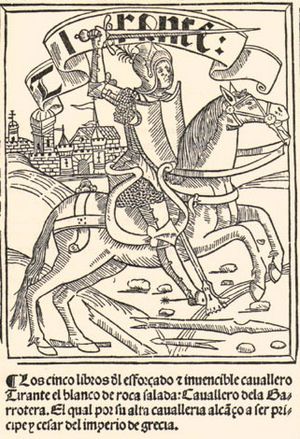Tirant lo Blanch facts for kids

Title page of the first Castilian-language translation of Tirant lo Blanch, printed in Valladolid by Diego de Gumiel
|
|
| Author | Joanot Martorell Martí Joan de Galba |
|---|---|
| Original title | Tirant lo Blanch |
| Country | Kingdom of Valencia |
| Language | Valencian |
| Genre | Chivalric romance |
| Set in | Europe, north Africa, Middle East, 15th century AD |
| Publisher | Martí Joan de Galba |
|
Publication date
|
1490 |
| 849.9 | |
|
Original text
|
Tirant lo Blanch at Script error: The function "name_from_code" does not exist. Wikisource |
Tirant lo Blanch (modern spelling: Tirant lo Blanc) is a famous chivalric romance book. It was written by a knight from Valencian named Joanot Martorell. His friend, Martí Joan de Galba, finished it after Martorell died. The book was first published in Valencia in 1490.
The title "Tirant lo Blanch" means "Tirant the White." It's the name of the main character. This hero helps save the Byzantine Empire in the story. It is one of the most important books from the Middle Ages written in the Valencian language. Many people consider it a masterpiece of Valencian literature and Catalan language literature. The book also used many Valencian proverbs. It even influenced later writers like Miguel de Cervantes, who wrote Don Quixote.
Contents
The Story of Tirant lo Blanch
Tirant lo Blanch tells the exciting story of a knight named Tirant. He comes from Brittany, a region in France. Tirant goes on many adventures across Europe.
Knightly Adventures and Battles
First, Tirant takes part in knightly competitions in England and France. Later, the Emperor of the Byzantine Empire asks for his help. The Empire is in danger from the Ottoman Turks, who are invading. Tirant agrees to help. He becomes a top commander, known as the Megaduke, and leads the Byzantine army.
Tirant defeats the invaders and saves the Empire. After this big victory, he continues fighting the Turks. His battles take him to many places in the eastern Mediterranean Sea and North Africa.
A Hero's End
Sadly, Tirant dies just before he can marry the beautiful princess, who is the heir to the Byzantine Empire.
What Makes the Book Special
Tirant lo Blanch is different from other knightly books of its time.
Real Feelings and Daily Life
Most knight stories showed heroes with very pure and calm love. But Tirant is full of life and shows real, human feelings. He experiences love that is more down-to-earth and sometimes even uses sarcasm. The book also describes everyday life in a very realistic way. These descriptions can be simple and sometimes even a bit harsh.
How the Book Influenced Others
Tirant lo Blanch is a very important book written in Valencian. It was written by Joanot Martorell in the 15th century.
A Unique Knightly Novel
The Tirant is unusual because it feels very real and sometimes funny. It also seems to include parts of Martorell's own life. The story follows the brave actions and adventures of Knight Tirant lo Blanc from Brittany.
History and Imagination
Sometimes, the book's events are similar to the life of Roger de Flor. He was a leader of a group of fighters called Almogàvers. They fought in Asia Minor and Greece, sometimes for and sometimes against the Byzantine Emperor. This connection to history is clear when the book describes events near Constantinople. It also shows the defeat of Sultan Mehmed II "the conqueror."
The real Fall of Constantinople in 1453 was a huge shock to Christian Europe. It meant the end of the Byzantine Empire. Martorell's book might have been his way of changing history to how he wished it had happened. This makes it an early example of what we now call alternate history.
Cervantes' Favorite Book
The famous Spanish writer Miguel de Cervantes loved Tirant lo Blanch. In his book Don Quixote, he called Tirant "the best book in the world." He said it was "a treasure of enjoyment and a gold mine of recreation."
Cervantes liked that Tirant was different from typical knightly stories. For example, characters had funny names, there was a cheerful widow, and knights in the book ate, slept, and even died in their beds after making a will. These details made the book unique and often funny. Cervantes enjoyed funny books and believed the world needed more of them. He saw this 100-year-old book as a true gem in his library.
Other Versions of the Book
Translated for New Readers
Tirant lo Blanch has been translated into many languages. These include French, Italian, Spanish, Polish, Russian, Finnish, German, Dutch, Swedish, and Chinese.
There are also modern English translations. One was by David H. Rosenthal (1983, 1996). Another was by Ray La Fontaine (1994), titled Tirant lo Blanc: The Complete Translation. There is also a version in modern Catalan.
A Film Version
In 2006, a film was made based on the book. The movie focuses on the later parts of Tirant's adventures. It shows the events that led to his involvement in Constantinople and what happened afterward.
See also
 In Spanish: Tirante el Blanco para niños
In Spanish: Tirante el Blanco para niños
 | Misty Copeland |
 | Raven Wilkinson |
 | Debra Austin |
 | Aesha Ash |

